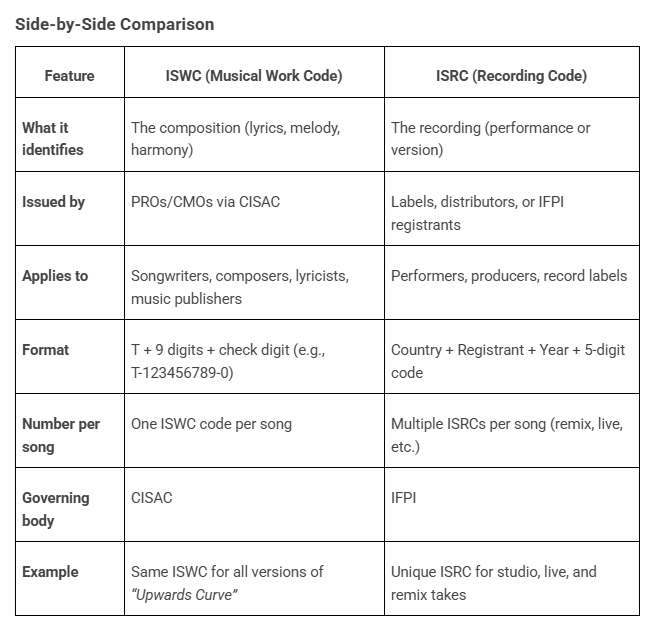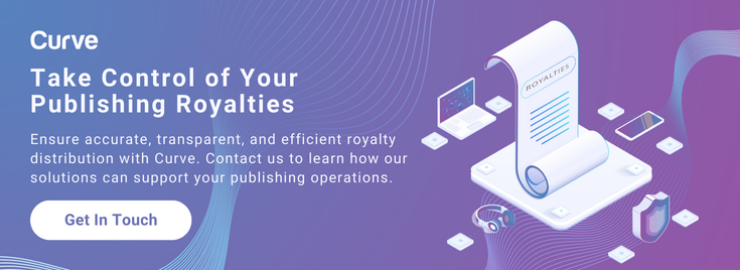ISWC vs ISRC: What’s The Difference?
If you’ve ever dug into the metadata side of music, you’ve probably come across two codes that sound almost identical: ISRC and ISWC. At first glance, they look like two versions of the same thing, but industry professionals know better! These identifiers serve different purposes, and knowing the difference can make or break how your royalties are paid and tracked.
The ISWC: The Composition’s Identifier
The International Standard Musical Work Code (ISWC) is all about the song itself, the composition. The composition is the bare bones of the song: the melody, lyrics and harmony.
Let’s say someone writes a song called “Upward Curve.” Once they register it with a performing rights organisation (like ASCAP, BMI, PRS, etc.), it gets an ISWC. The ISWC is assigned to the composition forever, no matter who performs it or how many times it gets recorded.
It doesn’t matter if the song is sung by the original writer, a famous artist covers it, and a jazz band does an instrumental version; it will have the same ISWC every time.
The system is run globally by CISAC (International Confederation of Societies of Authors and Composers), but local PROs handle the actual assignment of ISWCs. The code itself always looks like this: T-123456789-0.
The ISRC: The Recording’s Identifier
Now flip the coin. The International Standard Recording Code (ISRC) is for the recording, the actual audio file or video.
Back to “Upward Curve”. If the artist decides to release a studio version, a live concert version, and then a remix, each one gets its own ISRC. They’re all based on the same song, but they’re unique recordings, hence why each one needs to be tracked and accounted for separately.
The ISRC is issued by the record label, distributor, or sometimes directly from an ISRC agency. It’s a 12-character code that often looks like this: US-ABC-23-00001. The objects tell you the country, the registrant (label or artist), the year, and the track number.
This system is managed by the International Federation of the Phonographic Industry (IFPI).
To Recap: Song Vs Recording
Here’s the simplest way to think about it:
- ISWC = a code for the song (composition, written by the songwriter)
- ISRC = a code for the recording (performance, captured by artists and producers)
Why Both Matter
ISWCs and ISRCs play vital roles in music catalogue metadata management. These codes are what make sure people get paid.
- ISWC makes sure songwriters and music publishers get their royalties when the composition is used, whether it’s performed live, streamed, synced in a film or otherwise made available.
- ISRC makes sure recording artists, producers, and labels get their royalties when that specific version is streamed, downloaded, or played on the radio.
Millions of songs are available for consumption, and many of them have the same song titles. Without unique identifiers in place, money can slip through the cracks or be paid to the wrong composition or recording. This is why metadata plays a vital role in today’s music industry; it makes royalty accounting more accurate and allows it to be automated.

How Curve’s Software Handles ISRCs And ISWCs
Curve’s software stores ISRCs and ISWCs on catalogue items and uses these identifiers for royalty matching. We understand the value of unique identifiers and metadata management, so we apply various validations to these data points to make sure our clients’ catalogue is clean and ready for registration and matching. For example, we validate ISRCs and ISWCs on formatting and uniqueness: ISRCs and ISWCs can only exist once in the platform.
We don’t stop at validating your existing data; we also allow you to find gaps in your ISRC and ISWC data and fix them.
Our Spotify Search tool allows clients to download their catalogue from Spotify, including all the metadata stored there, such as Title, ISRC and Artist.
For ISWCs metadata management, we provide music publishers with an ISWC Services tool. This toolset allows publishers to look up existing ISWCs for their catalogue, as well as request early assignment of ISWCs for new songs directly from the Curve platform. The ISWCs will be provided by CISAC or the publisher’s PRO.
Wrapping It Up
So here’s the bottom line: the ISWC code is the identifier for the composition, and the ISRC is the identifier for the recording. One can’t replace the other; they work together to keep track of who did what and make sure everyone gets their fair share. As a music publisher, record label or distributor, having a complete and clean metadata set for your catalogue plays a vital role in song registration, royalty collection and royalty matching.
Curve’s software can help you get on top of your catalogue metadata: from cleaning your existing data, validating your ISRCs and ISWCs and looking up missing code information with our catalogue data features. Contact us for more information.
.png)






